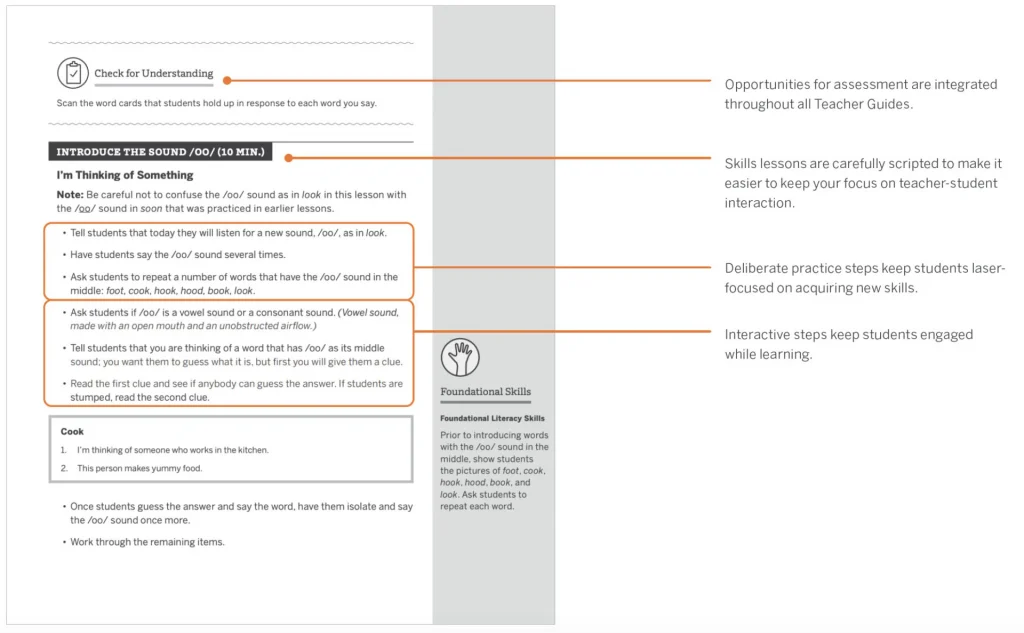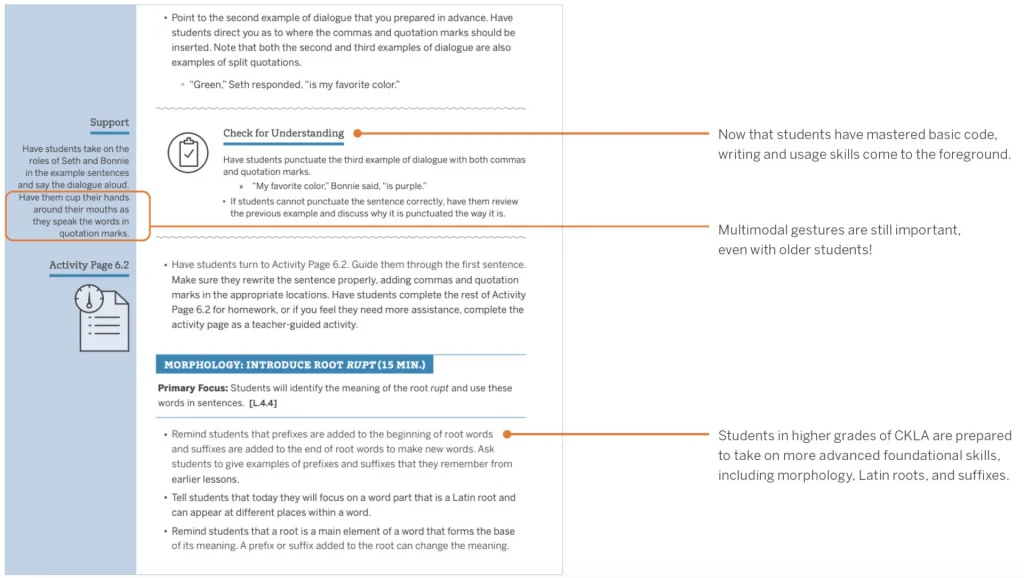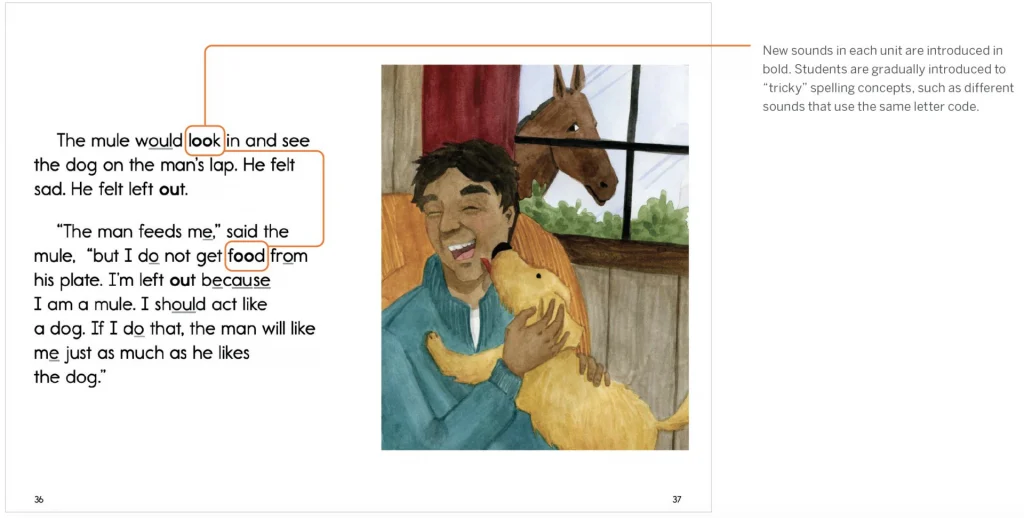The science behind our skills instruction
Every day in the Amplify CKLA K–2 classrooms, students practice their existing reading skills while stretching themselves toward new goals.
Regardless their grade level, all students will experience Skills instruction that is:
- Reserach-based: The program is built out of an exhaustive review of reading research, with special emphasis on the findings of the National Reading Panel, Diane McGuinness, Marilyn Jager Adams, and Louisa Moats.
- Explicit: All 44 sounds and their 150 spellings in the English language are taught, practiced, and mastered in diverse settings.
- Sequential: An intentional sequence of instruction that gradually builds in complexity ensures students master concepts and gain independence before moving forward.
- Rewarding: Decodable chapter-books and engaging stories featuring dynamic plots and characters inspire kids to read more.
In addition, Skills instruction within the program reflects four key principles.
All Amplify CKLA skills instruction starts with phonological awareness, which research shows benefits the greatest number of students. Students begin by learning to recognize sounds, as well as to articulate them.

Sound Library
The Sound Library provides additional digital support and practice. Sound videos show mouth movements to help students practice articulating new sounds, while sound songs have fun, catchy lyrics that help kids learn to recognize the sounds they’ve just learned.
Once students are familiar with a sound, they’ll learn to analyze it in terms of phonemes, which begins to build the bridge between sounds and letter codes. We support you and your students with a variety of techniques and remediations designed to integrate well into your existing classroom.
Once students can recognize sounds, they learn to form the corresponding letter codes. Amplify CKLA starts by teaching the sound-spellings that appear most frequently in English, which lets your students read and write as many words as possible, as soon as possible.
Amplify CKLA lessons continue to challenge students as they progress, introducing complications like multisyllabic words, “tricky words,” and homophones. In each case, students encounter complications as they become ready for them.

In addition, as students progress through the grades, skills practice continues but becomes integrated with the overall curriculum.
Proven resources for practicing skills
Great reading instruction starts with helping kids develop great reading skills.
In addition to separating skill development lessons from lessons that emphasize comprehension, Amplify CKLA utilizes carefully crafted resources that give kids confidence. As a result, the program helps student develop the foundational skills they need without delaying them from learning key vocabulary and critical thinking skills.
As students move through the curriculum, their understanding of the code becomes more sophisticated. That’s in large part due to Amplify CKLA’s decodable readers that grow more advanced along with students’ skills.

Throughout the K–2 Skills units, we ask students to practice their writing skills along with their reading. Student book reports on the readers and other reflective assignments help build good writing habits early and prepare students for the challenges ahead.
Skills scopes and sequences by grade
Download scopes and sequences for each grade below.
- Grade K Skills Scope and Sequence
- Grade 1 Skills Scope and Sequence
- Grade 2 Skills Scope and Sequence
- Grade 3 Skills Scope and Sequence
- Grade 4 Skills Scope and Sequence
- Grade 5 Skills Scope and Sequence
Dyslexia supports within Amplify CKLA
Amplify CKLA is based on decades of cognitive science and classroom-based research and includes phonological awareness, phonics, vocabulary, comprehension, and fluency as central literacy components.
The International Dyslexia Association defines Structured Literacy as an approach that focuses on systematic and explicit instruction in word identification and decoding, and includes the following elements: phonology, sound-symbol association, syllables, morphology, syntax, semantics. Further, Structured Literacy calls for evidence-based teaching principles such as:
- Systematic and cumulative instruction.
- Explicit instruction that includes multisensory teaching.
- A diagnostic element so teachers can use evidence from formal and informal assessments to make adjustments in the classroom.
Amplify CKLA not only includes all of these elements, it was built on them.
In Grades K–2, the program uses a unique two-strand instructional approach to target knowledge and skills. The scope and sequence intentionally builds foundational skills by:
- Beginning with critical phonological awareness and phonemic awareness instruction before moving into letter-sound knowledge and basic and advanced decoding and encoding.
- Giving students opportunities to practice decoding and word recognition skills both in isolation and in connected text using 100% decodable readers.
- Ensuring new skills are taught explicitly, practiced and reviewed regularly, and assessed frequently with checks for understanding, formative assessments, and formal assessments, including diagnostic/placement assessments and benchmark assessments.
For students who need more help with decoding and encoding words Amplify CKLA provides activities and materials for targeted reinforcement and intervention by way of two online resources:
- Assessment and Remediation Guides for K-3
- Intervention Toolkit
Contact us
Have a question about the program? Your Account Executive, Tommy Gearhart, is happy to help.
Tommy Gearhart
Senior Account Executive
505-206-7661
tgearhart@amplify.com
